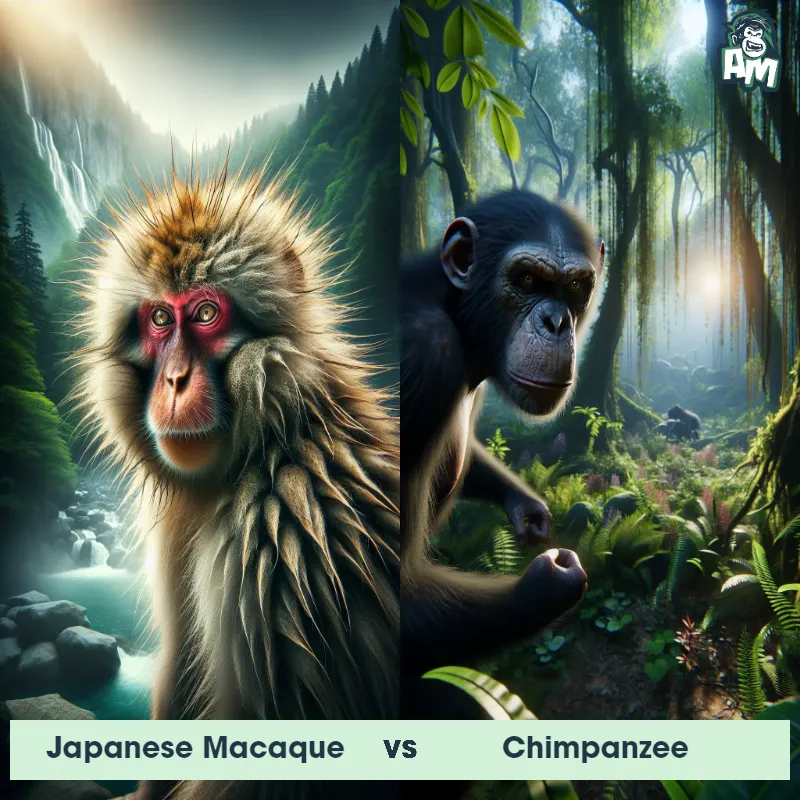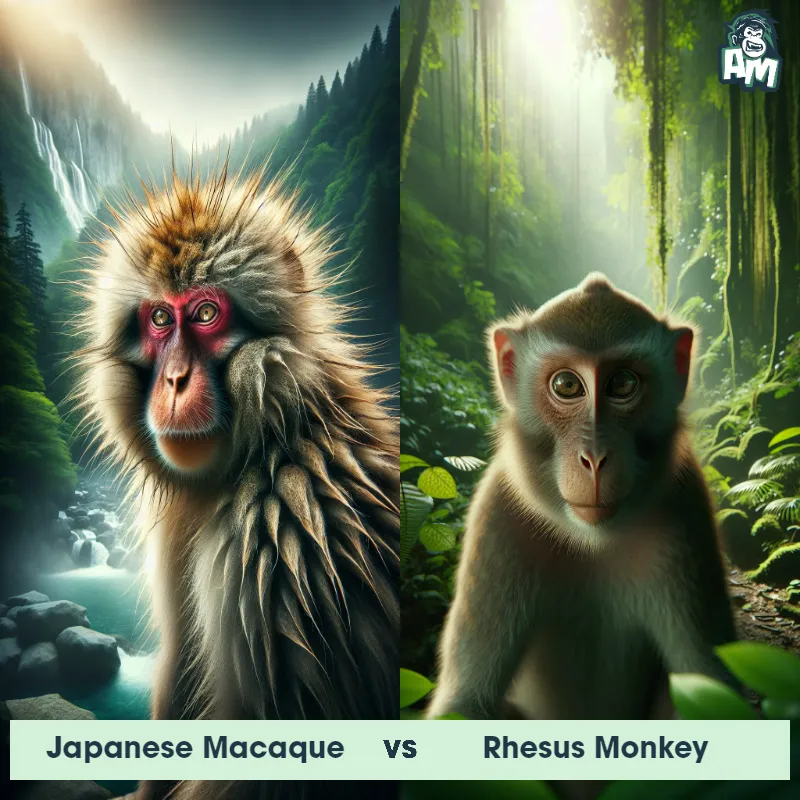The Japanese Macaque
The Japanese Macaque, also known as the "Snow Monkey," is a species of monkey native to Japan. These medium-sized primates have a brown to grey coat of fur that thickens during winter to adapt to the cold climate. They have distinctive red faces with expressive faces and a short tail. Japanese Macaques are highly social animals, living in troops and exhibiting complex behaviors like grooming, vocalizations, and hierarchical structures.

| Japanese Macaque | |
|---|---|
| Size | 20-24 inches (50-60 cm) tall |
| Weight | 24-66 pounds (11-30 kg) |
| Speed | 20mph (32km/h) |
| Key Strength | Strong jaws and teeth for biting |
| Biggest Weakness | Lacks physical aggression |
| Scientific Name | Macaca fuscata |
| Family | Cercopithecidae |
| Habitat | Forests, mountains, and hot springs |
| Geography | Japan |
| Diet | Omnivorous - fruits, leaves, insects, and small animals |
| Lifespan | 15 years - 25 years |

The Japanese Macaque
The Japanese Macaque, also known as the "Snow Monkey," is a species of monkey native to Japan. These medium-sized primates have a brown to grey coat of fur that thickens during winter to adapt to the cold climate. They have distinctive red faces with expressive faces and a short tail. Japanese Macaques are highly social animals, living in troops and exhibiting complex behaviors like grooming, vocalizations, and hierarchical structures.
Fun Fact: Japanese Macaques are known for their unique behavior of soaking in hot springs to keep warm during the winter months.
| Japanese Macaque | |
|---|---|
| Size | 20-24 inches (50-60 cm) tall |
| Weight | 24-66 pounds (11-30 kg) |
| Speed | 20mph (32km/h) |
| Key Strength | Strong jaws and teeth for biting |
| Biggest Weakness | Lacks physical aggression |
| Scientific Name | Macaca fuscata |
| Family | Cercopithecidae |
| Habitat | Forests, mountains, and hot springs |
| Geography | Japan |
| Diet | Omnivorous - fruits, leaves, insects, and small animals |
| Lifespan | 15 years - 25 years |
Japanese Macaque Matchups
We use AI to simulate matchups between the Japanese Macaque and other animals. Our simulation considers size, strength, and natural predatory behaviors to determine the most likely outcome.

Can't find the Matchup you want?
Create Your Own MatchupJapanese Macaque: Diet, Predators, Aggression, and Defensive Behaviors
What do Japanese Macaques eat?
Japanese Macaques are omnivores, and their diet consists of a wide variety of foods including fruits, seeds, insects, leaves, bark, and sometimes small animals. They have also been observed washing their food in water before eating, a behavior unique to this species.
Do Japanese Macaques have any predators?
Adult Japanese Macaques are not typically preyed upon by other animals due to their large size and social group dynamics. However, young macaques may be vulnerable to predation by large birds of prey, such as eagles.
Are Japanese Macaques aggressive?
Japanese Macaques are known for their complex social structure, which includes hierarchical dominance relationships. While they may display aggression towards each other to establish dominance within the group, they are not generally aggressive towards humans unless provoked.
Do Japanese Macaques fight?
Japanese Macaques are known to engage in fights, especially among males competing for dominance within the group. These fights can be intense and may involve biting, hitting, or vocal threats. However, most conflicts are resolved through non-violent displays of dominance.
How do Japanese Macaques defend themselves?
Japanese Macaques have several strategies for defending themselves against potential threats. When faced with danger, they may vocalize loudly to alert the group, display aggressive behaviors towards the threat, or retreat to higher ground where they are less vulnerable to predators.
What is the biggest weakness of Japanese Macaques in a fight?
Despite their social structure and physical prowess, a Japanese Macaque's biggest weakness in a fight may be their vulnerability when isolated from the group. These primates rely on their numbers and cooperative behaviors for protection, so individuals separated from the group may be more susceptible to attacks from predators or rival groups.
Fun Fact: Japanese Macaques have a diverse diet that includes a variety of fruits, leaves, insects, and even small vertebrates, showing their adaptability and resourcefulness in finding food.
Fun Fact: In addition to their intelligence and social behavior, Japanese Macaques also demonstrate cultural traits by passing on learned behaviors from one generation to another, such as using tools to obtain food or protect themselves from predators.












